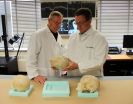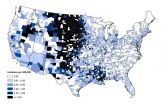Rockefeller scientists resolve debate over how many bacteria fight off invaders
2015-05-07
(Press-News.org) Every inch of our body, inside and out, is oozing with bacteria. In fact, the human body carries 10 times the number of bacterial cells as human cells. Many are our friends, helping us digest food and fight off infections, for instance. But much about these abundant organisms, upon which our life depends, remains mysterious. In research reported May 7 in Cell, scientists at Rockefeller finally crack the code of a fundamental process bacteria use to defend themselves against invaders.
For years, researchers have puzzled over conflicting results about the workings of a type of immune system found in many species of bacteria. Some data showed that, when a virus invaded a bacterial cell, this mechanism -- known as type III CRISPR-Cas -- would target the virus's DNA, preventing it from adopting the bacteria's machinery in order to copy itself and infect more bacteria. But other experiments suggested type III CRISPR-Cas could only disable a virus by cleaving the viral RNA.
Luciano Marraffini and Poulami Samai, both at Rockefeller, wanted to get to the bottom of this puzzle. In their experiments, Samai, a postdoctoral fellow, tested the cleavage of DNA and RNA by the type III CRISPR-Cas system. But she added a key ingredient no one else had before, a protein known as RNA polymerase, which the cell uses to transcribe DNA to RNA. She and Marraffini, head of the Laboratory of Bacteriology, saw that CRISPR-Cas did, indeed, cleave the RNA produced from a virus's DNA -- but it would also cleave the virus's DNA.
There are advantages to such a two-pronged system, says Marraffini. Many viruses integrate into the genomes of the cells they infect and remain dormant, he says, causing no harm. In fact, these viruses can be beneficial to bacteria, by carrying toxins that help bacteria promote their own survival, for instance. The diphtheria toxin, for instance, is secreted by a species of bacteria, but the gene encoding the toxin comes from a virus. "By requiring viruses to begin transcribing their DNA into RNA before disabling them, the type III CRISPR-Cas system leaves dormant viruses intact, allowing them to continue benefiting the bacteria that host them," he notes.
Learning the details of how microbes carry out their functions can have important implications for health and science, Marraffini says. Besides being an incredibly abundant form of life on the planet, fueling the health and disease of every species and ecosystem, microbes have been the source of a number of technological tools that have revolutionized science and medicine.
"More than forty years ago, scientists discovered enzymes that cut DNA from studying the viruses that infect bacteria, inspiring a new class of tools that created a revolution in biomedicine," says Marraffini. Now, new technology based on another type of CRISPR-Cas is leading another wave in that revolution, allowing scientists to quickly and easily manipulate genomes in ways they never could before. "This is a testament to how the basic biology of microbes can be very useful. Microbes are a crucial part of biology on the planet, and it's important to understand how they work."
INFORMATION:
ELSE PRESS RELEASES FROM THIS DATE:
2015-05-07
EAST LANSING, Mich. - Much like a finger leaves its own unique print to help identify a person, researchers are now discovering that skull fractures leave certain signatures that can help investigators better determine what caused the injury.
Implications from the Michigan State University research could help with the determination of truth in child abuse cases, potentially resulting in very different outcomes.
Until now, multiple skull fractures meant several points of impact to the head and often were thought to suggest child abuse.
Roger Haut, a University Distinguished ...
2015-05-07
PULLMAN, Wash.--Washington State University researchers say the popularity of bamboo landscaping could increase the spread of hantavirus, with the plant's prolific seed production creating a population boom among seed-eating deer mice that carry the disease.
Richard Mack, an ecologist in WSU's School of Biological Sciences, details how an outbreak could happen in a recent issue of the online journal PLOS One.
Bamboo plants are growing in popularity, judging by the increased number of species listed by the American Bamboo Society. Some grow in relatively self-contained ...
2015-05-07
WASHINGTON -- Can a true, robust global health framework be created to help prevent tragedies like Ebola while at the same time allow countries to meet everyday health needs?
Georgetown University global health and law experts say it can be done, and in a special issue of "The Lancet" focusing on global health security, they propose specific priorities to transform a fragmented health system into a "purposeful, organized" framework with national health systems at its foundation and an empowered World Health Organization at its apex.
"The Ebola epidemic in west Africa ...
2015-05-07
The west African Ebola epidemic has rekindled interest in global health security, but it has also highlighted a troubling lack of political commitment to public health, and it is far from clear whether the crisis will be enough to rejuvenate global health security, say leading global health experts writing in The Lancet.
Through a series of essays [1], the review, which is published as part of a special issue on global health security, explores different perspectives on the wider lessons that can be drawn from the outbreak, including how it has demonstrated the importance ...
2015-05-07
Your genes may influence how sensitive you are to emotional information, according to new research by a UBC neuroscientist. The study, recently published in The Journal of Neuroscience, found that carriers of a certain genetic variation perceived positive and negative images more vividly, and had heightened activity in certain brain regions.
"People really do see the world differently," says lead author Rebecca Todd, a professor in UBC's Department of Psychology. "For people with this gene variation, the emotionally relevant things in the world stand out much more."
The ...
2015-05-07
For faster, longer-lasting water filters, some scientists are looking to graphene --thin, strong sheets of carbon -- to serve as ultrathin membranes, filtering out contaminants to quickly purify high volumes of water.
Graphene's unique properties make it a potentially ideal membrane for water filtration or desalination. But there's been one main drawback to its wider use: Making membranes in one-atom-thick layers of graphene is a meticulous process that can tear the thin material -- creating defects through which contaminants can leak.
Now engineers at MIT, Oak Ridge ...
2015-05-07
BOULDER--New research has identified correlations between weather conditions and the occurrence of West Nile virus disease in the United States, raising the possibility of being able to better predict outbreaks.
The study, by researchers with the National Center for Atmospheric Research (NCAR) and the Centers for Disease Control and Prevention (CDC), finds strong correlations across much of the country between an increased occurrence of West Nile virus disease and above average temperatures in the preceding year. The scientists also find that precipitation influences ...
2015-05-07
Latin American women in Los Angeles County are twice as likely as white women to contract cervical cancer, according to the Los Angeles County Department of Public Health, and are significantly less likely to be educated about the causes of the disease or to be screened for it.
That needs to change, say USC researchers, who are finding ways to make it happen.
"Latinas are the ones most at risk and yet health communication campaigns still essentially target white women," said Sheila Murphy, professor at the USC Annenberg School for Communication and Journalism.
Murphy ...
2015-05-07
Researchers at the RIKEN Brain Science Institute have uncovered a new mechanism for the regulation of blood pressure. Published in Molecular Cell, the study links events at the single-cell level to a system-level effect, showing that blood pressure can drop dramatically if the protein ERAP1 is released from cells and enters the blood stream.
Because high blood pressure is a primary risk factor for stroke, heart disease, and diabetes, understanding how our bodies naturally regulate blood pressure is essential for developing treatments that help keep it at normal levels. ...
2015-05-07
A study, published today in Cell, demonstrates the power of organoids to capture, in three dimensions, the multiple mutations that occur in tumours. Organoids, small clusters of cells that accurately mimic the behaviour of human tissue, can be used to test cancer drugs and, eventually, to identify effective personalised treatments for patients.
Until now, cancer drug screening has primarily been carried out using two-dimensional cell lines grown in dishes, or in mouse models. Organoids, which more closely resemble human tumours than cell lines, and are less time and ...
LAST 30 PRESS RELEASES:
[Press-News.org] Rockefeller scientists resolve debate over how many bacteria fight off invaders

